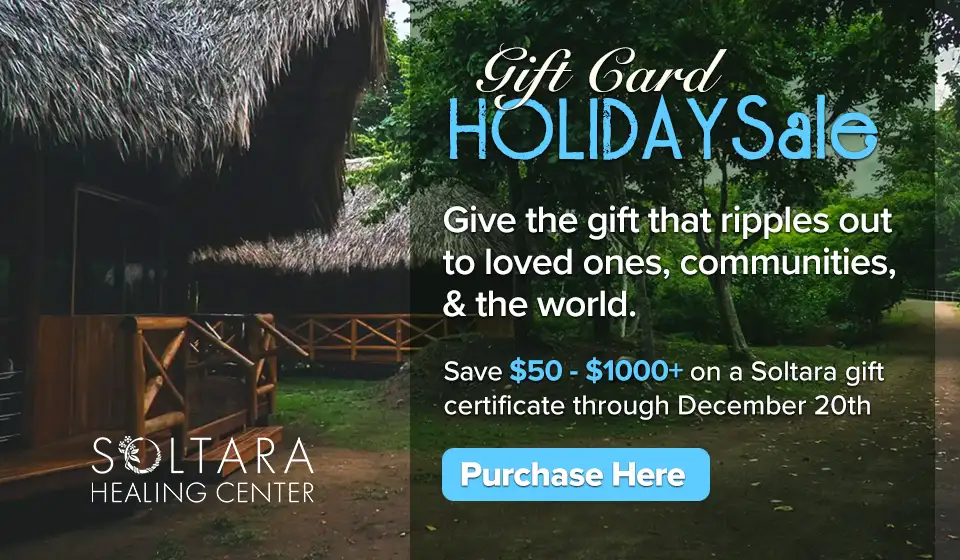
“Humanity is our ultimate community, and everyone plays a crucial role.”
— Yehuda Berg
We at Soltara have found, through our experience, that so much of healing comes from being vulnerable, breaking down walls, letting people in, and holding space for others to do the same. When we authentically share stories, struggles, and ideas, we open up the space to figure things out on a deep level, and remember that we are not alone.
The importance of healthy connection and community can not be underestimated. At its core, it is a basic human need – in truth, from the time we are born, we cannot survive without it. We are fundamentally social creatures: studies show that the experience of social pain (a snub, a cruel word) is as real as physical pain1. Lack of social connection is worse for our health than obesity, smoking, or high blood pressure2. Conversely, positive relationships and community lead to improved immune systems, mental health, compassion and empathy for others, even a longer life3. The relationships in our lives help define how we grow, learn, love, and navigate this world. They also reflect our relationship with ourselves, and can be an avenue towards better understanding of who we are and our purpose in life.
“In the Buddhist tradition it is said: ‘Seek the Buddha (the state of enlightenment), seek the Dharma (the teachings that lead to liberation), and seek the Sangha (the community of seekers on the path).’ Just as we cannot become enlightened alone, we cannot heal alone. We are meant to heal in community. Our need for one another is both our greatest vulnerability and our greatest strength.”
— Douglas Bloch
Realizing we cannot walk this path alone, we can look towards who we choose to share it with. By consciously examining the relationships in our lives, we can determine which ones serve our highest good, and which ones we may need to reconsider if they are holding us back. Our energy and time is finite, and valuable, so pursuing relationships that inspire us and push us forward on our path are of utmost importance to our long-term health, goals, and life.
“A deep sense of love and belonging is an irresistible need of all people. We are biologically, cognitively, physically, and spiritually wired to love, to be loved, and to belong. When those needs are not met, we don’t function as we were meant to. We break. We fall apart. We numb. We ache. We hurt others. We get sick.”
— Brené Brown
Indigenous communities and traditional belief systems understand the value of community. The classic phrase “it takes a village to raise a child” has deep meaning – in many cultures, the interconnectedness between the health of the individual and the health of the community was well accepted, and so issues that arose within one person were addressed by the whole. In traditional Native American medicine, for example, family and community are seen as crucial aspects of a treatment plan, as is ceremony. Through communal participation in song, prayer, music, and dance, the family and community contribute healing energy to the patient – the more people present, the greater the healing4. We expand upon this philosophy and work towards a global network and healing community that connects across borders, cultures, and belief systems, and works toward a common goal of individual and collective healing.
“I define connection as the energy that exists between people when they feel seen, heard, and valued; when they can give and receive without judgment; and when they derive sustenance and strength from the relationship.”
— Brené Brown
At Soltara, we invite you into a safe and loving space to further your process with people who respect and understand the spiritual value of authentic connection and community. By walking together on this path, we can share the burden of struggle, celebrate the joy of healing, and along the way, become so much more than the sum of our parts.
Sources
1. Cook, Gareth. “Why We Are Wired to Connect.” Scientific American, 22 Oct. 2013, www.scientificamerican.com/article/why-we-are-wired-to-connect.
2. House, JS, et al. “Social relationships and health.” Science, American Association for the Advancement of Science, 29 July 1988, science.sciencemag.org/content/241/4865/540.
3. Seppala, Emma. “Connect To Thrive.” Psychology Today, Sussex Publishers, 26 Aug. 2012, www.psychologytoday.com/blog/feeling-it/201208/connect-thrive.
4. Koithan, Mary, and Cynthia Farrell. “Indigenous Native American Healing Traditions.” The journal for nurse practitioners : JNP, U.S. National Library of Medicine, 1 June 2010, www.ncbi.nlm.nih.gov/pmc/articles/PMC2913884.


